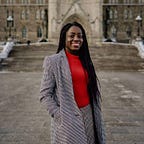#FixTheCountry: Ghana’s People Power and the Ongoing Need for Diaspora Solidarity
Country hot/Country hot /Chale!/Plenty no get what to eat/Even the king di feel the heat- Country Hot
On August 4th this year, Ghanaians across the country took to the streets chanting #FixTheCountry — a call to the nation’s leaders to address the high levels of inequality which leave large segments of the Ghanaian population without access to quality education, healthcare, employment, and without prospects that make them feel hopeful for their future. In this article, I will discuss the significance of the protest and some ways Ghanaians and other Africans in the diaspora can stand in solidarity with our siblings fighting for change on the ground.
‘When we revolt it’s not for a particular culture. We revolt simply because, for many reasons, we can no longer breathe’- Franz Fanon
According to an Oxfam report Building a More Equal Ghana: a five point action plan to close the gap between the rich and the rest, “just one of the richest men in Ghana earns from his wealth more in a month than one of the poorest women could earn in 1,000 years.” Oxfam’s figures are significant because they illustrate the inequality that underpins Ghanaian society which has only been exacerbated by the COVID 19 pandemic — especially for those on the margins of society. Ghanaians who are cisgender, male, heterosexual, older, wealthy, upper middle class, Akan and Christian primarily benefit from the unjust status quo. The culture of silence and fear along with the collusion of the media, political institutions, churches, the criminal justice system and education system upholds their privilege, and disadvantages women, Muslims and non Christians, LGBTI+ Ghanaians, ethnic minorities, communities located in the north, children, people with disabilities and people living in poverty.
Thus, the emergence of the #FixTheCountry movement represents a much needed break from business as usual. The leaders of the #FixTheCountryMovement are young, tech savvy and undeterred by intimidation tactics. The #FixTheCountry movement defines itself as a “non-partisan and non-political civic movement by young people who are mobilizing thousands of people to build a better Ghana where no person will have to lack their basic rights as a Ghanaian.”
Ghanaians have been bequeathed with a rich inheritance as the first African country to demand independence from European colonial rule and right now, that legacy demands that we fight for a country that is free and just for all people, regardless of a citizen’s ethnicity, socio-economic status, gender identity, faith or lack thereof, ability and or sexuality.
To be Ghanaian is essentially to be a freedom fighter- Kinna Likimani
Before the August 4th protest, Ibrahim “Kaaka” Mohammed (Rest in peace and power), a member of the ‘Economic Freedom Fighters’ was murdered by security forces in Ejura, an Asante region of Ghana, which led to more protests and outrage on social media with the hashtag #WeAreAllKaaka. Ibrahim “Kaaka” Mohammed embodies the courage and self determination of poor Ghanians to demand change by organizing to hold leaders and political institutions accountable. Their example is an invitation for us, Ghanians in the diaspora, to work with them from the relative safety of our homes.
Here are some ways Ghanaians living abroad can support the movement;
- Raise awareness about the #FixTheCountry movement among your peers by sharing their content on your social media pages. Raise the visibility of the movement by putting a #FixTheCountry filter on your social media display pictures, and bring up the movement during conversations with friends, family members, and peers.
2. Donate to the #FixTheCountry solidarity fund. Donations will go towards purchasing placards, printing tee-shirts, and providing face coverings for those participating in the protests.
3. Volunteer your time and skills in administration, mobilization, finance or design to the #FixTheMovement by filling out their volunteer form.
4. Organize or join #FixTheCountry protests in front of the Ghanaian embassy within your respective country.
5. Sign and share the Justice for Kaaka petition which demands an “independent investigation into the unjustified use of force that has resulted in the loss of civilian lives.”
Thank you for reading. In the next article I will discuss how Christians, especially Pentecostal Christians, can contribute to emerging social justice movements in Ghana and other African countries.
Until the ink drips
Akua Bie
